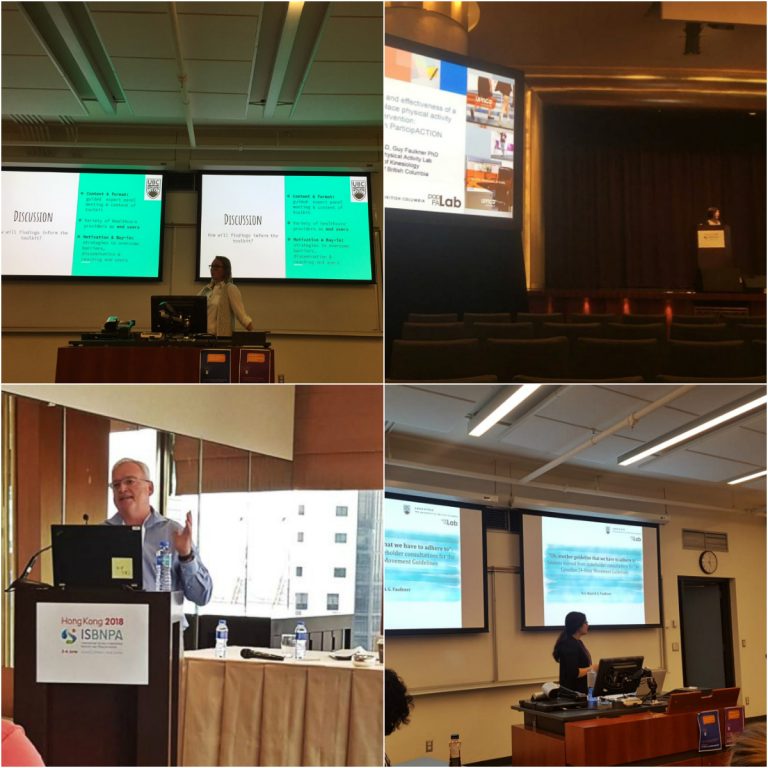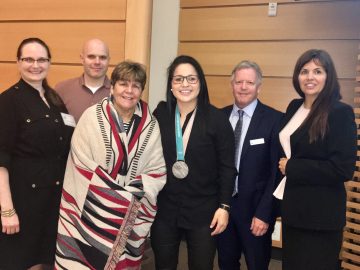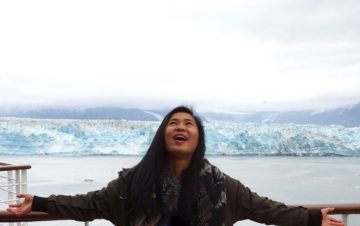Graduating Year: 2019
Hometown: Richmond, BC
Stream: Interdisciplinary Studies
Employer: CHANGE BC
Position Title: Student Kinesiologist
ISBNPA & QRSE 2018 conferences
Jun. 14, 2018 – It has been a whirlwind of a month at the Pop-PA Lab ! Congrats to Dr. Guy Faulkner and Dr. Erica Lau for their presentations at the International Society of Behavioral Nutrition and Physical Activity (ISBNPA) conference in Hong Kong. And congrats to PhD students Krista Glowacki and Negin Riazi for their presentations at the 6th International Conference on Qualitative Research in Sport and Exercise (QRSE) here in Vancouver.

Congratulations to Dr. Guy Faulkner
Apr. 26, 2018 – Congratulations to Dr. Guy Faulkner who was awarded the Rossy Family Foundation grant for the development of the Canadian Campus Wellbeing Surveillance System. Read about other recent grant awards of KIN Faculty here.
New Paper Out
Apr. 24, 2018 – New paper out by Dr. Leila Pfaeffli Dale and Dr. Guy Faulkner titled Smartphone app uses loyalty point incentives and push notifications to encourage influenza vaccine uptake.
Congratulations to KIN faculty on recent grant achievements
Congratulations to the KIN faculty who have submitted applications and been awarded in recent external research grant competitions.
SSHRC Insight Grants
Applicant: Dr. Moss Norman (KIN)
Co-Investigators: Dr. LeAnne Petherick (EDCP), Dr. Heather McRae (U Manitoba), Dr. Michael A. Hart (U Manitoba)
Collaborators: Dr. Andrea Bundon (KIN), Mr. Edward M. Albert (U Manitoba), Mr. Gerald Mason (Fisher River Cree Nation)
Restor(y)ing place-based Indigenous physical cultural identities: Examining the relationships between movement, land, language, and masculinities
$192,982 | 5 years
Applicant: Dr. Brian Wilson (KIN)
Collaborator: Mr. Bradley J. Millington (U Bath)
Real Utopian experiments in environmentalist sport: a focus on golf
$112,566 | 5 years
Applicant: Dr. Meghan McDonough (U Calgary)
Co-Investigators: Dr. Peter Crocker (KIN); Dr. Jennifer Hewson (U Calgary)
Social support for social participation and physical literacy for older adults
$84,000 | 2 years
NSERC Discovery Grants
Applicant: Dr. Gunter Sigmund (KIN)
Engineering approaches to preventing or mitigating whiplash injuries
$45,800 per year | 5 years
Applicant: Dr. Darren Warburton (KIN)
Cardiovascular physiology in the extremes: mechanisms of adaptation
$67,500 | 1 year
National Indian Brotherhood Trust Fund
Applicant: Dr. Darren Warburton (KIN)
Co-Investigators: Dr. Shannon Bredin (KIN), Dr. Jan Hare (LLED), Dr. Moss Norman (KIN)
Collaborators: Dr. Rosalin Miles, Gail Sparrow
Strengthening Indigenous Education in Health and Well-being
$100,000 | 1 year
Rossy Family Foundation
Applicant: Dr. Guy Faulkner (KIN)
Development of the Canadian Campus Wellbeing Surveillance System
$193,000
New Papers Out – The ‘New’ ParticipACTION
Apr. 23, 2018 – Read the new papers by Dr. Guy Faulkner and Dr. Lira Yun in the special issue of Health Promotion and Chronic Disease Prevention in Canada (The ‘New’ ParticipACTION ). Read about Exploring the impact of the ‘new’ ParticipACTION: overview and introduction of the special issue and ParticipACTION after 5 years of relaunch: a quantitative survey of Canadian organizational awareness and capacity regarding physical activity initiatives.

